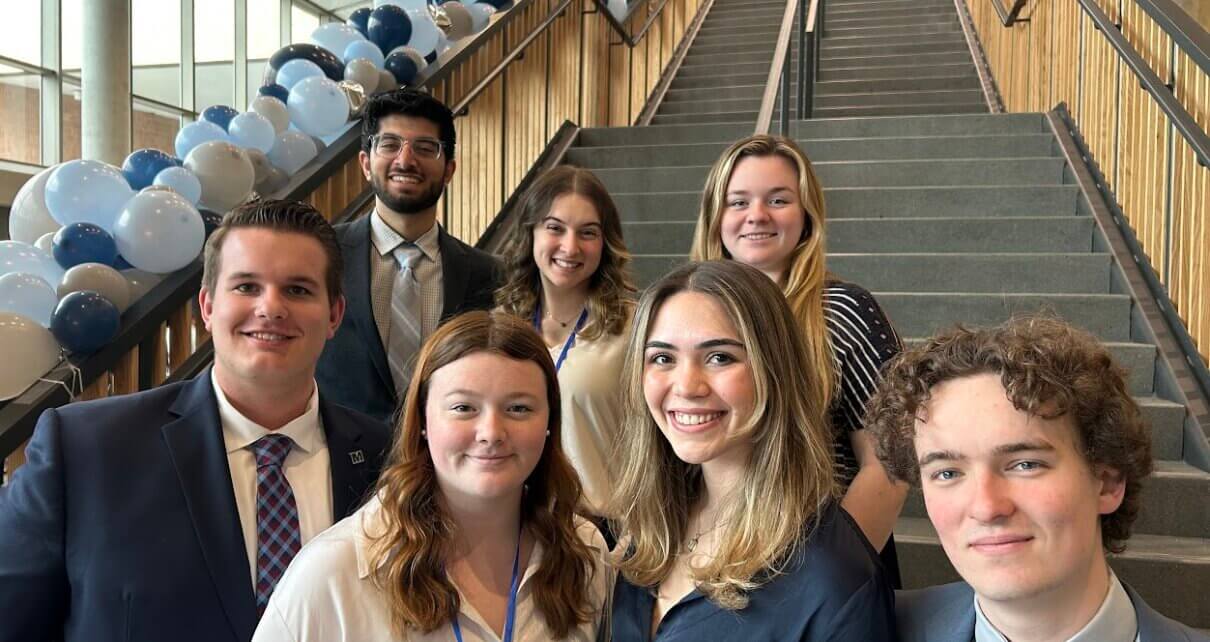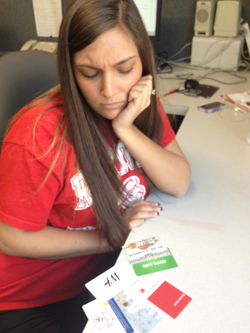Monmouth’s Student Government Association (SGA) attended the Conference of Student Government Associations (COSGA) hosted by Texas A&M University from Friday, March 31 to Monday, April 3.
SGA is the governing body of all the student clubs and organizations on campus. The association recognizes over 100 groups every year, overseeing the annual funding process for eligible clubs and providing financial assistance to organizations that wish to sponsor a program or event.
Attending this conference is a longstanding SGA tradition, which invites Monmouth’s SGA executive board members to converse with fellow senators from universities across the country.
“This trip gave us the opportunity to network with other SGAs and exchange/filter ideas with one another. It’s been a tradition for over 15 years, but was conducted remotely due to COVID,” began Haider Husaini, junior marketing student and Chief Justice of SGA.
As per their website, “SGA’s mission is to promote the health and welfare of Monmouth University’s student body.” According to Monmouth’s delegates, their learnings from the conference will help them carry out this core responsibility.
Michaela Foley, junior social work student and Vice President of SGA, explained, “The overarching purpose of the trip was to develop our senators’ leadership skills and return to Monmouth with new and innovative ideas that we can potentially use in the future.”
“We met and connected with fellow student governments to learn about how other schools are handling government on their campuses,” elaborated Alexa Kopczynski, junior mathematics and elementary education student and President of SGA.
The attending group participated in various workshops hosted by multiple universities, such as the University of Connecticut, Western Michigan University, and Saint Francis University, and even held a workshop of their own. These workshops focused on consistent branding, recruitment and retention, restructuring organizations, and more.
Monmouth’s SGA presentation was titled, “Building a Better Senate: Communication, Camaraderie, and Collaboration.” The description of Monmouth’s SGA presentation states, “The Monmouth University SGA is at a crossroads. Declining demographics have changed the landscape at which schools like ours operate. This year’s administration has engaged in a wholistic effort to build a better Senate under three key points: communication, camaraderie, and collaboration. From budget allocation to senator engagement and departmental relations, the road to building a better Senate begins within.”
“We discussed how through internal and external efforts, we can build a more engaging, inclusive, and impactful organization,” elaborated Foley. “The highlight of the trip was when we completed our presentation. It was a rewarding feeling after all our hard work. I am beyond proud of everyone’s dedication.”
In addition to the workshop presentations, students participated in round robins and attended talks featuring keynote speakers.
Among some of the students, there was one keynote speaker in particular that was especially noteworthy: Carlotta Walls Lanier, the youngest Little Rock Nine member.
Foley continued, “She [Walls-Lanier] told her story of how she was the youngest member to integrate Central High School and how her journey forever broke down barriers, changing the social landscape of America.”
Other keynote speakers included Tara Storch, Co-Founder and President of Taylor’s Gift Foundation; Reagan Pugh, professional speaker and facilitator; and Dwight Roblyer, senior lecturer in the Department of Political Science at Texas A&M.
“COSGA exposes us to different ways of thinking and pushes senators to think outside of the box as we approach the problems that our University faces,” emphasized Tanner Purdy, sophomore finance and real estate student and Director of Specialty Funding.
Kopczynski indicated the significance of attending such an event, “I think it is important for student leaders to participate in conferences like this one because it truly is so eye-opening to see what else is out there— ideas that you may have never even thought of and people you wouldn’t have gotten to meet otherwise. Not only are you being exposed to new ideas, cultures, and way of leadership, but you are building your leadership skills and networking with people from across the whole world.”
Keifer Walsh, sophomore criminal justice student and Chair of the Student Affairs Committee, added, “There were so many interesting students with amazing experiences, stories, and ideas that all were so open and talkative. It was also really nice to get to connect more with my fellow Monmouth friends who came on this trip, and I feel as though we all grew a lot closer over the course of the weekend.”
Walsh’s sentiment was shared across the board. “While we have held retreats and team bonding activities this past year, this was the best experience I have had in SGA in terms of learning about my fellow senators,” concurred Husaini.
As for the group’s takeaways, each senator emphasized the importance of implementing their new learned ideas on campus.
“My biggest takeaway from COSGA was the need for camaraderie within a Senate. We won the Outstanding Student Government Association Award not only because of the programs and initiatives we undertake, but also because of the camaraderie that has allowed us to take them on in the first place. It is now time for us to build that same camaraderie within other student organizations so that when we collaborate, we are oriented for success,” responded Purdy.
On the other hand, Walsh was less certain as to what exactly the group would pursue. “It’s hard to say any one specific thing that we intend to use, just because of the sheer quantity of ideas that were thrown out. As time goes on, I’m sure we will narrow down certain key factors we want to focus on, but for now I think our focus will be in new strides in our diversity, equity, and inclusion statement, specifically with regards to mental health on campus.”
Husaini agreed, “We intend on adopting some of the DEI initiatives from other institutions to our SGA. This includes written statements, the formation of new positions/committees, and more.”



